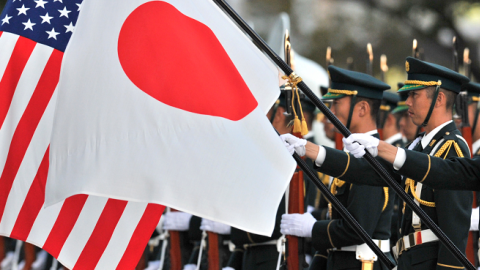On July 1, Japanese Prime Minister Shinzo Abe's cabinet approved a reinterpretation of Japan's constitution with regard to national defense. It would allow the military to join multinational peacekeeping operations, come to the aid of allies like the United States when they are attacked, and cooperate more fully with U.S. or South Korea if Japan itself is attacked.
If the parliament endorses the change, not only will Japan be stronger and safer. The new rule will also strengthen U.S. strategic ties with East Asia's leading democracy and could lead to a treaty on defense trade that would be good for both countries.
Japan's 1946 constitution renounced war as "a sovereign right of the nation" and banned the creation of any military except for self-defense. The provision made sense after a world war triggered by Japan's militarist-industrialist clique that cost the lives of tens of millions. But as Mr. Abe told a NATO meeting in Europe this spring, in the present era "it is no longer possible for any one nation to secure its own peace and security by itself."
"The state of the world surrounding Japan is growing increasingly severe," Mr. Abe noted, referring to the current tensions with China over Japan's potentially oil-rich Senkaku Islands in the East China Sea, but also the looming threat of a nuclear-armed North Korea. As if to underline Mr. Abe's words, Pyongyang carried out a new series of ballistic-missile tests on June 29.
Japan's Self-Defense Forces already are formidable. It has more ships than the French navy, more jet fighters than the British RAF, and an army larger than Germany's, as well as some of the most sophisticated weapons systems in the world. Yet if North Korea had fired its missiles toward Hawaii, or a U.S. Navy or South Korean vessel came under attack off the Japanese coast, Japan could do nothing.
Mr. Abe's rule would reinterpret Japan's constitution to permit "collective self-defense," in other words allow it to come to the aid of its allies. Some in Japan consider the measure controversial, as do some of Japan's neighbors including China. But Defense Secretary Chuck Hagel has welcomed the vote as making "the U.S.-Japan alliance even more effective," as well as boosting America's strategic presence in the Pacific.
Japan is an ally well worth encouraging—especially an ally that's been a functioning liberal democracy for nearly 70 years, and is the third-largest economy in the world.
There are two steps the U.S. can take to raise its relationship to Japan, and reassure other nations in the region that a new, more proactive Japan will strengthen peace and stability in Asia but not mark a return to an imperial-militarist past.
The first step is to update the security cooperation guidelines both countries signed in 1978 and last revised in 1997—which both countries have agreed to do by the end of this year. Japan's Self-Defense Forces are capable of assuming more of the military burden in any conflict or contingency operation, than in the past. There is also a need to improve cooperation between the two countries on air and missile defenses, counterterrorism, reconstruction assistance programs, and cyberwar.
Second, it is time to forge a treaty covering trade in military hardware and services between Japan and the U.S. President George W. Bush signed Defense Trade Cooperation Treaties with the U.K. and Australia in 2007, and the Senate ratified them in 2010. The U.S. has had a series of agreements with Canada for several decades that eliminate standard export controls on defense articles. And there is already an agreement with Japan on anti-ballistic missile defense, signed in 2004, that allowed Japan to build ballistic-missile interceptors using sensitive U.S. technology.
A comprehensive defense-trade treaty would allow the U.S. to trade many defense articles with Japan without unnecessary export licenses or other cumbersome written authorizations. It will avoid the bureaucratic entanglements and turf wars between the departments of Defense, State and Commerce that bedevil most significant overseas arms sales. It would also open the door for Japanese defense firms to cooperate more closely with the U.K., Australia and NATO countries in supplying, for example, high-end electronic components for advanced weapons systems.
In short, such a treaty would enhance strategic cooperation with Japan and help to raise our own military effectiveness in the face of gathering threats.
Winston Churchill coined the phrase "special relationship" to describe the ties between the United States and Great Britain. It was a relationship based on shared democratic and cultural values but also on close military cooperation and shared strategic interests, above all deterring aggression and preserving global stability.
The Japanese cabinet vote shows the time is ripe to launch a special relationship with our oldest democratic ally in Asia. It is better to do so now, before events make it a matter of forced necessity instead of strategic choice.




















